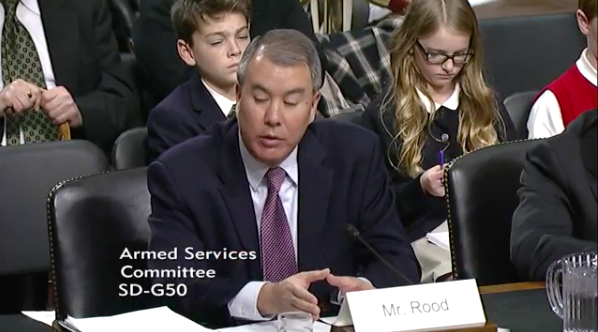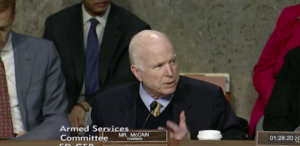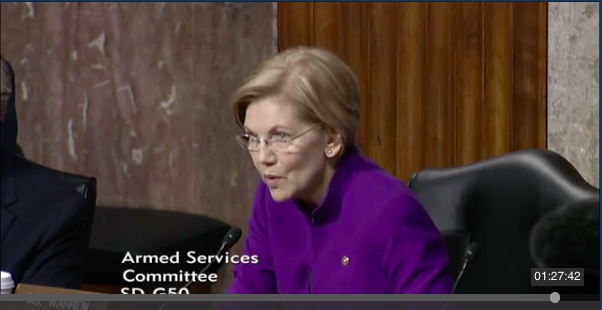Top Trump DoD Policy Nominee In Trouble: McCain, Warren Hammer Lockheed Exec
Posted on

John Rood
CAPITOL HILL: President Trump’s nominee for the Pentagon’s top policy job appears to be in jeopardy after a bipartisan savaging by Senators John McCain and Elizabeth Warren this morning. At issue: Whether John Rood, who runs international sales at the world’s largest defense contractor, Lockheed Martin, would recuse himself from policy discussions affecting Lockheed’s arms exports if he becomes under secretary of defense for policy, the Pentagon’s No. 3 job.
Seeming nervous and ill-served by counsel, apparently unable to look either senator in the eye, Rood kept woodenly repeating (seven times!) a formula that he’d recuse himself from “any particular matter” — i.e. regarding a specific Lockheed sale — but kept dodging the broader question on policy even after McCain lost patience.

Sen. John McCain derides Rood’s testimony at this morning’s hearing.
“Mr. Rood, I suggest you answer the question, or you’re going to have trouble getting through this committee,” said the famously combative Senate Armed Services chairman. McCain has generally been Trump’s most prominent Republican critic — no other GOP senators joined his onslaught this morning — and he had specifically warned the administration not to submit more nominees from the defense industry.
“I don’t like your answers. Most of us don’t like your answers,” McCain said as he wrapped up the confirmation hearing. “We’ll be giving you written questions, and I suggest that you answer them thoroughly and completely. Okay?”
“Yes, sir,” Rood said quietly.
 It’s worth noting the rights and wrongs here are not clear-cut. While McCain and many other good-government types have crusaded against the so-called “revolving door” between the Pentagon and industry, ruling out private-sector nominees eliminates a tremendous and often deep pool of talent. And while it certainly makes sense for officials to recuse themselves from any decisions directly affecting a former (or potential) employer — as Rood did — it’s much messier to ask them to avoid “policy discussions” where that employer might come up. Given that Lockheed Martin is the largest defense contractor on Earth, forcing Rood to step out of any discussions that might affect its foreign sales — and Warren’s demand could be read that way — means he probably couldn’t engage in any discussion touching on arms exports, a crucial tool of foreign policy.
It’s worth noting the rights and wrongs here are not clear-cut. While McCain and many other good-government types have crusaded against the so-called “revolving door” between the Pentagon and industry, ruling out private-sector nominees eliminates a tremendous and often deep pool of talent. And while it certainly makes sense for officials to recuse themselves from any decisions directly affecting a former (or potential) employer — as Rood did — it’s much messier to ask them to avoid “policy discussions” where that employer might come up. Given that Lockheed Martin is the largest defense contractor on Earth, forcing Rood to step out of any discussions that might affect its foreign sales — and Warren’s demand could be read that way — means he probably couldn’t engage in any discussion touching on arms exports, a crucial tool of foreign policy.
“Those senators were trying to make sure he couldn’t do his job,” said one dismayed former Hill staffer. “They were trying to trap him and knew what they were doing.”
Warren’s demand for Rood to recuse himself from a wide range of policy discussions “could be a huge expansion of ethics restraints that could set a terrible precedent,” the staffer said. “‘Policy matters’ and ‘particular matters’ are two different things. Particular matters deal with a particular program or contract or FMS sale. Policy could be construed to (mean) recusing yourself from the entire foreign sales process; it could even apply to the assessment of what other countries need to defend themselves because tangentially Lockheed Martin could benefit.”

Mackenzie Eaglen
“If he agreed to that dramatic a restriction,” the staffer said, “the Defense Department lawyers could really make it impossible for him to do his job.”
“The debate was over the parsing of the term ‘policy discussions,’ as opposed to FMS-specific conversations about what capabilities should a given allied country have from a given US defense contractor,” said MacKenzie Eaglen, a defense analyst at the conservative American Enterprise Institute. “I think they’re both right. He could’ve found a way to say ‘yes’ and she could’ve been more understanding of the nuances of the job and how different subjects get intertwined.”
Nuances aside, “that was some tough watching indeed,” MacKenzie said of the hearing webcast — but she still expects Rood will ultimately be confirmed.

Sen. Elizabeth Warren questions John Rood.
A Last-Minute Blow-Up
The blow-up was especially unexpected because the first hour of the hearing went pretty smoothly for Rood and his colleague Randall Schriver. Schriver, who faced no opposition, is nominated to serve as assistant secretary of defense for Asia and Pacific affairs. While both men are currently in the private sector, they both have extensive government experience, similar to many recent nominees but in stark contrast to the billionaire neophytes Trump nominated early in his presidency. Both Rood and Schriver served at both Defense and State; Schriver served in the Navy; and Rood worked at the NSC, CIA, and as a Senate staffer (not that it helped him much today).

Randall Schriver
As usual, McCain pressed harder than any other senator, but he initially kept himself to matters of state: great power competition, policy on North Korea and Pakistan, and the defense bill’s provisions requiring the administration to formulate long-overdue strategies for national defense, cyberspace, and countering Russia. It was Warren, a Democrat, who brought up Rood’s corporate entanglements at the very end of the hearing. The exchange is worth reproducing at some length:
You’ve signed the standard White House ethics pledge to recuse yourself from all discussions involving your former employer for two years, Warren asked Rood, but the law allows you to ask for a waiver: “Will you commit not to seek such a waiver during your time in office?”
“Sen. Warren,” Rood began, “the ethics agreement that I’ve signed with the Office of Government Ethics requires me to divest myself of all financial…”
“Yes, I know what the agreement does,” Warren interrupted. “My question is, will you agree not to apply or ask for a waiver?”
“Well, Senator,” Rood replied, “the standard that’s applied to me is the same one that’s been applied to nominees and those that have served in the administration — the past administration, the previous one, the Obama administration, and this one. I plan to live by, very scrupulously, by the ethics agreement I’ve signed with the Office of Government Ethics.”
Warren: “Will you agree not to ask for a waiver?”
Rood: “That agreement that I have signed with the Office of Government Ethics…”
“I’m going to take that as a ‘no,’” Warren said, drowning out the rest of Rood’s answer. “Mr. Rood, to be very specific about this, you served as Senior Vice President for Lockheed Martin International…You were responsible for selling Lockheed’s products to other countries. In your new role, you will be responsible for developing defense policy, including overseeing policy on foreign military sales to those very same countries. Will you recuse yourself from policy discussions about the sale of Lockheed products via the Foreign Military Sales and Financing programs?”

Lockheed Martin’s iconic project and the Pentagon’s biggest procurement program, the F-35, bearing the flags of countries that plan to purchase it.
“Senator, this is a matter I take very seriously,” Rood said. “I’ve consulted with the Defense Department’s chief ethics counsel, including as recently as yesterday, about that specific matter.” (The counsel may in fact have over-prepped him, which would explain his rigid, formulaic language). “The department has well-established processes in place. I am recused from any particular matter involving Lockheed Martin for a period of two years. I will have financially divested myself…”
Warren interrupted. “I’m asking a question: Will you recuse yourself from policy discussions?”
“Mr. Rood, I suggest you answer the question,” McCain added.
“Yes, yes, Mr. Chairman,” Rood said. “The answer to your question is that, on those things that involve a particular matter, I will work with the general counsel’s office to avoid involvement in any particular matter involving Lockheed Martin….”
“So the answer is no?” McCain cut in.
“The senator’s question, I believe, Mr. Chairman, was whether I would involve myself in any particular matter,” Rood said (note: actually, it wasn’t). “And the answer is, I would not involve myself in a particular matter related to Lockheed Martin.”
“So,” Warren said, ” you will recuse yourself from policy discussions about the sale of Lockheed products via the Foreign Military Sale and Financing programs?”

John Rood
“If those discussions were (to) involve some particular matter of a bearing to Lockheed Martin…” Rood tried again.
“I don’t understand why the answer isn’t just yes or no,” Warren said. (It’s worth noting that while the senator sounds admirably straightforward, demanding yes-or-no answers to complex questions is a standard tactic of legislators and prosecutors seeking to bully a witness into submission).
“Mr. Rood,” McCain said, “I suggest you answer the question, or you’re going to have trouble getting through this committee.”
“Yes, Senator, I’m trying to provide a clear answer,” Rood said, “but I’m — uh — those matters that involve particular matters that is something that affects the financial health of the company I’m recused from. If you’re describing a policy matter such as how the United States should have a relationship with another country in an arms area (i.e. arms sales), or cooperation between our air forces, the answer is I would be involved, and that would not pose a conflict of interest.”
Warren wasn’t satisfied: “So you’re saying you will not recuse yourself from policy discussions about the sale of Lockheed products via the Foreign Military Sales and Financing programs?
“I don’t intend to participate in conversations about the sale of Lockheed Martin products,” Rood said, still refusing to promise to recuse himself.
“It’s not a matter of participating in conversations, Mr. Rood,” McCain said (note: actually, it is). “Mr. Rood, we’re going to give you a question in writing because obviously you are ducking the answer (sic) here.”
Given time to think and consult the law, Rood — or rather the Pentagon’s lawyers — should be able to devise a satisfactory formula. But that’s not certain, given how intensely McCain and Warren’s staffers will be going over the language of the written answer. In the very best case for Rood, he’s going into his job with a black mark from Congress. In the worst case, he might not be going into this job at all.
Subscribe to our newsletter
Promotions, new products and sales. Directly to your inbox.
